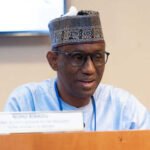The African Development Bank’s (AfDB) president, Akinwumi Adesina, has urged rich countries to keep their financial commitment towards mitigating the impact of climate change in developing countries.
Development Diaries reports that the AfDB president made this known at the Summit for a New Global Financial Pact in Paris, France.
Adesina said that rich countries whose financial commitments to Africa, some dating back to 2009, had yet to be honoured.
‘Africa alone loses $7 to $15 billion a year because of climate change, and that’s going to rise to about almost $50 billion a year by 2040, so the world has to meet its commitment, the developed countries of the $100 billion’, he said.
‘I mean it’s a very small amount of money compared to the scale of the problem, but by not meeting in it, it has a crisis of trust in developing countries’.
The summit aims to seek better responses to tackle poverty and climate crisis issues by reshaping the global financial system.
According to a report from CDP, Africa accounts for the smallest share of global greenhouse gas emissions, at just 3.8 percent, in contrast to 23 percent in China, 19 percent in the United States, and 13 percent in Europe.
Also data from the AfDB shows that the continent is the most vulnerable continent to climate change despite having contributed the least to global warming and having the lowest emissions.
Although Africa is currently responsible for an insignificant amount of total global greenhouse gas emissions, it is under significant threat from climate change.
Despite bearing the least responsibility for the problem, the continent already faces more severe climate change than other parts of the world, as nine out of ten most vulnerable countries to climate change are in Africa.
Africa’s economies, infrastructure investments, water and food systems, public health, agriculture, and livelihoods are all at risk due to the severe effects of climate change.
The escalating crisis and impending famine in the drought-stricken Horn of Africa, according to the World Meteorological Association (WMA), demonstrate how climate change can exacerbate water shocks, endangering the lives of hundreds of thousands of people and destabilising communities, nations, and entire regions.
One of the successes recorded at the end of the COP27 summit in November 2022 was a breakthrough agreement to provide loss and damage funding for vulnerable countries hit hard by climate disasters.
Furthermore, the decision to establish new funding arrangements, as well as a dedicated fund, to assist developing countries in responding to loss and damage was reached at the summit.
Development Diaries calls on wealthy polluters to fulfil commitments of funding towards mitigating the effects of climate change on the African continent.
Source: Africanews
Photo source: AfDB




